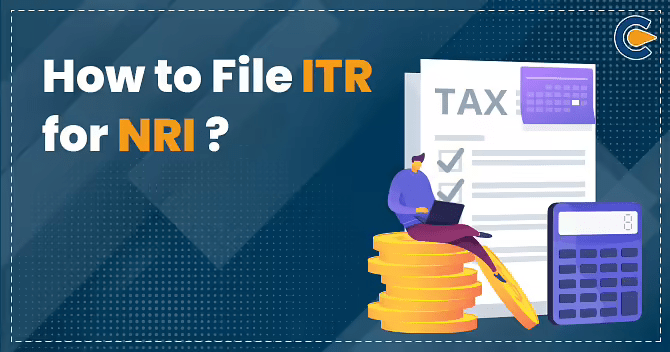ITR – Stands for Income Tax Return. It is a form of declaring Income from multiple sources and paying taxes to the income tax department. It contains details of Income and tax-saving investments made by individuals during the financial year. However, this article will discuss how to file (Income – Tax return) – ITR for NRI(Non-Residential Indian)[1] in India.Further, we will discuss several forms of ITR and which forms are required to file by NRI.
NRI – Stands for Non-Resident Indian, is a citizen of India or person of Indian origin who is not a resident of India. The question arises whether the Non-Resident Indian should file a Return of Income depends on whether the NRI has taxable Income in India.
Status of NRIs
- If an Individual stays less than 60 days in India in a financial year.
- Secondly, when the stay is in excess of 60 days but is lesser than 182 days and the cumulative stay in the four years preceding the year in question is lesser than 365
- Finally, when an individual departs from India to take up employment outside India and the duration of stay is lesser than 182 days in the year of departure.
How many types of ITR Forms are there?
There are different types of ITR forms which are published on the Income Tax portal for filing Income Tax returns.
- ITR – 1
- ITR – 2
- ITR – 3
- ITR – 4
- ITR – 5
- ITR – 6
- ITR – 7
Does it is required to file ITR for NRI?
It is required to file ITR for NRIs in India if they have taxable Income in India. Let’s take an example an NRI having an income of rent from a House property in India has to file Income Tax Return if the rental Income exceeds the exemption limit. The tax is applicable to the Income of NRI, and he has to file his ITR in India. The tax is applicable to NRIs for the following Income.
- Any Income which arises or accrues In India
- An Income which is deemed to arise or accrue In India
- AnyIncome which is deemed to be received in India
- Any Income received from India
Additionally, losses from the financial year may only be carried forward and offset against Income from subsequent financial years once the tax return for the year of loss has been submitted. Finally, late submission of a return is subject to a penalty interest charge of 1% per month on the outstanding tax. If the IT Return is not submitted within a year of the end of the relevant financial year, a fine of Rs 5,000 may also be assessed. As a result, NRIs must file their income tax returns on time.
Why NRI is not required to file ITR?
ITR for NRI is exempted from filing only if the specified condition is satisfied. The specified condition is that the NRI Income in the financial year should consist of only Investment Income. The Income may also arise from Long term Capital Gain, which is taxed at 15%. However, in either case, Income should have been deducted from the Income at the source.
Due Date of ITR for NRI
ITR for NRI must be filed on or before the due date of 31 July of Assessment Year. However, if the NRI is a working partner of a firm whose books are required to be audited, then the due date for filing ITR is 30 September. If Assessee has missed the due date of filing a return, he can also file a belated return.
Exemption Available in ITR for NRI
- Interest earned on government-issued bonds and saving certificate
- Capital Gain earned on long-term Investment
- Interest generated from FCNR or NRE Accounts
- Dividends accrued from Indian Company shares
Deduction available to NRI
The following are the deduction available to NRIs?
- Section 80C
- Section 80E
- Section 80TTA
- Section 80D
- Section 80G
Procedure for Filing ITR for NRI
NRI can file Income Tax returns online. The detailed procedure to be followed for filing ITR for NRI is discussed below for a better understanding.
- With the help of a Digital Signature (DSC), a person can furnish its Return.
- Transmitting the income tax data in Return electronically under the electronic verification code
- Transmitting the data in the Return electronically and then submitting the verification of the Return in FORM ITR-V
- In case the Assessee is using FORM ITR- V, the assesses should send a copy of ITR – V electronic Data processing centre in Bangalore, duly signed by the Assessee.
Online process
- STEP 1: An NRI has to apply for the PAN card by filing Form No. 49A
- STEP 2: Select the Tax return form and fill them in with essential information
- STEP 3: Upload all requisite documents and Digital signatures at the Online Portal of the Income Tax Department in India
Conclusion:
After reading this article, we can conclude that NRI can claim the available deduction which is mentioned under the act. There are certain exemptions which are also discussed as the procedure to file an ITR.
Read our Article:Types of ITR (Income Tax Returns)











